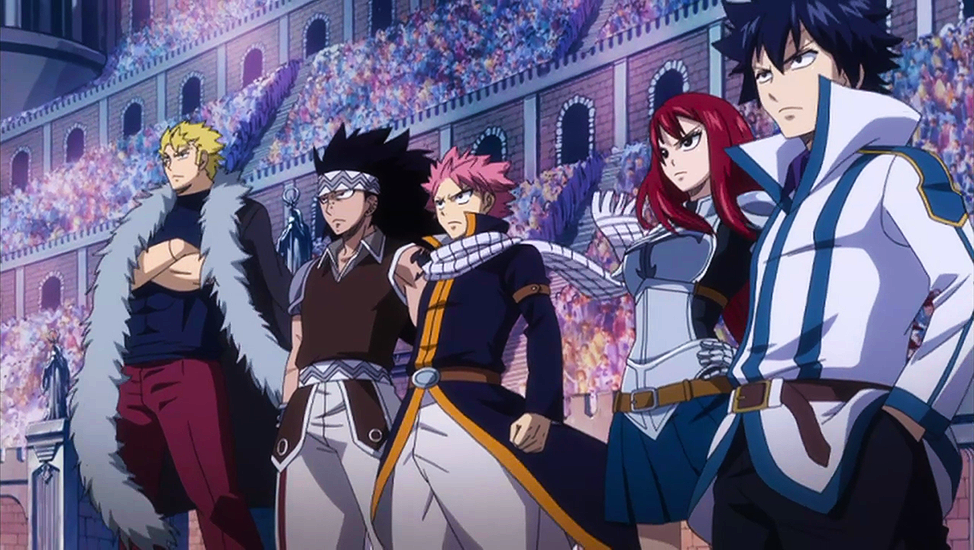An Anime Newbie Joins Fairy Tail: Gospel Response
Maybe you know that habit of an anime series, like Fairy Tail, to start a story arc and then eventually meander around to finishing that arc, say, three years later?
Well, that’s how it feels attempting to write my first anime review/analysis. Fairy Tail in particular has almost 300 episodes.1 But there’s simply too much to cover even in a four-part review, even if I’d kept to discussing its first 48 episodes. I haven’t been able to explore the animation style, the lost dragons subplot, Zeref, favorite characters or “filler” story irritants. All that must wait for another time, or lengthy backstory sequence.
I’ve explored Fairy Tail’s story and world; what is good, true, and beautiful about Fairy Tail; and what is bad, false, and ugly about Fairy Tail.2 Now it’s time to explore the fifth and final point:
The gospel answers Fairy Tail
How does the biblical gospel of Jesus Christ answer the good and bad in Fairy Tail’s world? How does the gospel battle these idols, smash them, and prove itself the strongest warrior?

From left: Fairy Tail magic guild members Laxus, Gajeel, Natsu, Erza, and Gray.
True strength through Christ
Fairy Tail suggests your chief end can be “getting stronger,” not just for individual growth but so you can defend your nakama. This can quickly become a false promise, because not everyone can “get stronger.” The world simply doesn’t work that way; the world is unjust. Something may stop you from getting stronger in the way you want. Anyway, is that really all life is about? Getting stronger for what purpose? If you were strongest, what’s next?
Against this idol, Scripture offers truths such as, “I can do all things through [Christ] who strengthens me.”3 The verse is often appropriated by athletes and celebrities to be about another truth: Jesus gives us talents and we can use them to exalt Him. But instead, the apostle Paul is talking about contentment in his circumstances. He does not speak only of strength, but of weakness. One verse before this one, Paul says:
I know how to be brought low, and I know how to abound. In any and every circumstance, I have learned the secret of facing plenty and hunger, abundance and need.4
 Paul is not talking about becoming a stronger individual, no matter what. He speaks about being personally content in Jesus, no matter what. The gospel is not just about Becoming Stronger. It’s about becoming like the strongest person of all, Jesus. And as Jesus shows in his ultimate feat of strength, sometimes true strength looks like weakness. Sometimes it doesn’t look like conquering a kingdom, but sacrificing yourself so others can live.
Paul is not talking about becoming a stronger individual, no matter what. He speaks about being personally content in Jesus, no matter what. The gospel is not just about Becoming Stronger. It’s about becoming like the strongest person of all, Jesus. And as Jesus shows in his ultimate feat of strength, sometimes true strength looks like weakness. Sometimes it doesn’t look like conquering a kingdom, but sacrificing yourself so others can live.
It’s far better to imitate the strongest Master of all, Jesus, than to follow lesser masters who are never strongest—especially when this greatest Master has already fought the ultimate monster, the monster of sin, and died and then came back to life by Himself to save us.
True nakama in Christ
Fairy Tail implicitly promises that if you can get stronger, you can protect your nakama, your special group of family/friends. But this promise is treated as the “chief end” of a guild member. It doesn’t work, because even friends/family will fail you, betray you, and worse.
Contrast this with gospel-centered nakama. God Himself is a “special group” of Persons who comprise one God. This is how “God is love,” and qualified as love even before He created people. (After all, love requires more than one party; it requires a lover and an object of love.) After God created people, He wanted them to love one another so we can reflect His love. Sin twists this purpose. So Jesus’s mission includes forming a Church: a gathering of people like family and deep friends, who can start repairing the broken image of humanity.
When we realize this, we can see deep family/friend relationships in better perspective. We do not prize them for their own value, but because they remind us about God’s nature.
That way, when our nakama does fail us in this corrupt world, we stand a better chance of picking up the broken pieces. We don’t stare at those shards, desperate to assemble them together. Instead we know where to look to find the Source of this relationship beauty. Even better, we can anticipate that day when all redeemed people are nakama in Jesus.
True conversion, repentance, and forgiveness in Christ

Three/fifths of these characters were previously villains.
In Fairy Tail, bad guys can repent and become good, but heroes may still call the villains’ sins “unforgivable.” As a villain, your only hope is to struggle for the rest of your life to atone for your sins.5 When you push this to its logical conclusion, this makes no sense. Gajeel abused Levy, then “turns good,” but we don’t even see him confess to her? Laxus rebelled against the guild, was properly disciplined, but when he returns he never clearly repents—only sets to work proving that he’s a good guy by making Fairy Tail’s enemies his enemies?
The biblical gospel offers the only perfect balance between two righteous and seemingly contradictory desires: our desire to see perfect justice done and guilty people punished, and our desire to give others a second chance (and better, get a second chance ourselves).
Paul’s letter to the Romans explains how God reconciles wrath and mercy in the gospel. One reason Jesus died was to remind us that God is perfectly just. He was not ignoring rebellion against Him (and injustice against other people). Instead, he was delaying the punishment and redirecting it to Jesus, our sacrifice.6 God never waits for us to “turn good” on our own, and then spend the rest of our lives struggling to “atone” for ourselves and prove ourselves to our friends in some vague, never-ending (and drama-intensive) process. Instead, He is Himself the atonement, and once He has finished the sacrifice, it is done forever.7
Thanks to Jesus, we therefore know better how to love our enemies. If they don’t repent, we leave their fate to God but love them anyway—which may mean “fighting” them in a sense to stop them from hurting others (or us).8 And if they do repent to God and us, we forgive them, having prepared all along for such a time.9 Consequences will remain. We may not enjoy friendship with repentant enemies today. But someday in the New Creation, when God has made the whole world his nakama, we will.
A gospel response to exploitation and fanservice

Erza just caught fans leering. Wouldn’t this ordinarily make them enemies of Fairy Tail?
Half of Fairy Tail takes a gospel-like side against public humiliation and abuse of people made in God’s image (especially women). But the story’s other half schizophrenically takes an anti-gospel side by delighting in people’s (especially women’s) embarrassment at, say, being found in compromising positions or clothing. The contradiction is absurd, and offers another false promise that doesn’t work in reality: Hey, you can enjoy these people as real humans, weeping with their struggles, but also enjoy them as if they were soft porn actors.
Fanservice is such a hollow promise. Exposing characters to “fun” exploitation is good for cheap laughs, but doesn’t help develop them as human beings. It distracts from the story. It can even lead logically to pornography and even sex slavery—including the worst kind of slavery, against our will, and the sort of slavery in which we willfully become slaves to sex.
Here the gospel exposes the absurdity: we cannot ultimately have this both ways. God has created men and women in his image. This means the human body is intrinsically beautiful in all its forms. In an innocent world, public nudity would have been fine. But we are not living in a perfect world. We’re living in a sin-corrupted world, where people abuse the goodness of the human body to gratify sinful desires, including but no limited to sexual lust.
Thus, God has shown mercy by establishing standards of clothing and prudence.10 He does not mean clothing to cover nasty parts of the body, but to serve as a symbol of his mercy. From Genesis 3 through the end of Revelation, we don’t see redeemed people going backward to innocent or “empowered” nudity. They go forward into a state of wearing clothes that symbolize Christ’s merciful covering.
Sexual fanservice promises that if you ignore this whole clothes-wearing standard, you can get your sexual thrills from a partial-person. But God has designed marriage and marriage alone, between a single man and woman, as the only “outlet” for Eden-like pleasure in private nudity and sexual arousal. God doesn’t let us divorce sexual nudity from marriage because he wants to steal our joy. Rather, He knows the partial-person attempts will lead to frustration and hollowness. So He wants to enhance our joy. He wants to show us that He is good and that He is the source of all pleasures—including the pleasure of whole-person human nudity enjoyed with someone you can love and who loves you in return.11
 Fairy Tail review series finale
Fairy Tail review series finale
Alas, the anime industry now owns me, at least a little bit. I have a paid subscription to Crunchyroll and everything. That’s where I found Fairy Tail, though for some reason some of the first episodes are missing now. You can also find the first 48 episodes exclusively on Netflix. But be warned. This guild will hook you in, and before you know it you’ll be binge-watching into the night, sincerely devoted to learning the outcome of Natsu Dragneel’s screaming battle with an owl-man in a jetpack, and tempted to writing four-part reviews.
- The series is on hiatus for guarded reasons—double-guarded, it seems, by lack of news and a language barrier. ↩
- I’ve actually re-titled those previous articles to clarify the focus of each. And I follow the five-part questions method suggested by Ted Turnau (disclaimer: coauthor on a project) in his book Popologetics. ↩
- Phil. 4:13. ↩
- Phil. 4:12 ↩
- In fact, the English word “atone” occasionally appears in subbed episodes of Fairy Tail. I’d love to study more what word(s) Japanese use that get translated this way. ↩
- Romans 3:21-26. My view is that Jesus received only the “amount” of divine wrath God would have otherwise poured out on Christians. Jesus did not receive all of God’s wrath, or potential wrath, for all sinners. Many Scripture texts speak in the present tense of God’s wrath still awaiting unbelievers, such as John 3:36 and Romans 12. ↩
- Hebrews 10:12. ↩
- Romans 12:14-21. ↩
- Luke 17:3-4. ↩
- These standards vary between cultures, and even within cultures’ eras and immediate settings, such as beaches versus formal dinners. I cannot get too deep here, except to say that I do find “prudence” (or “propriety”) is a better word to use about this topic than “modesty.” In Scripture the word “modesty” is used about humility of status and not about clothing styles or appropriateness. Unfortunately, a host of gleeful bloggers have stumbled upon this fact, and all of them write at length about how Christians are too hot on “modesty” and thus we don’t need to worry about prudence. ↩
- There’s much more to say about fanservice in Fairy Tail and elsewhere—its causes, its purposes, and even a Gospel response to these idols. But this is my best attempt at a quick response. ↩




























Okay, enough shounen, DO NATSUME’S BOOK OF FRIENDS the fifth season is finally simulcasting!!1!
Would jesus approve of fairy Tail?
Jesus would (and does) approve of Christians who practice biblical discernment and gospel joy as they engage the stories in the world around us.
I don’t think the ‘chief end’ is to get stronger in fairy tail rather to always be willing to fight for friend/family group. For example when the tenrou island arc ended with the whole group not being strong enough so the held hands and grouped their power together which saved them. I never felt the emphasis was put on ‘getting stronger’. Futhermore there are many speeches dedicated to saying sacrificing morality for power is wrong i.e Erza’s speech to Minerva. Even when she was about to be killed she beseeched Minerva to change her mind from attaining power and focus on living for her friends.
I agree. From the original article:
It’s all about defending/protecting your nakama, not just getting stronger for strength’s own sake. Similar ideas are quite in play in the longer-running manga/anime series One Piece, and I would suppose, plenty of other shonin stories.